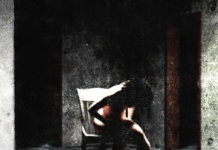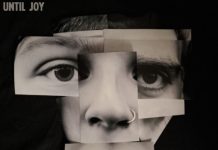Nightsong is John Reed – well known to us here at LSF as a cittern playing folkish singer/songwriter, producer/musician Ali Karim Esmaiil and songwriter/musician/producer Jo Beth Young – Talitha/RISE /Yates and Young. I reviewed the second release from the album – ‘The Spell’ – a while back, and was bewitched by it (sorry I couldn’t resist that).
Their music blends urban, folk, electro and progressive music into something that they describe as Ambient Electro-folk. What does root it in folk is that the songs tell stories; and in this case these stories lift the lid on the ordinary lives of English (and sometimes Scottish) medieval peasantry,highlighting curious and resonant parallels with life in 2020.
So these are songs where the words are as important as the music, the words are meant to be listened to. They are meant to provoke thought.
Opening track ‘Pauper’s Son’ features John on lead vocal, his cittern providing the most obvious sound. Behind these there are washes of sound, Jo Beth providing eerie vocals. It’s a striking start to the album. The music is hypnotic, the feel is dark, the words are dark. Look, any song that starts ‘Sheep devour the human flesh’ is going to grab the attention, and make you want to hear the rest of it. This is a song inspired by a print depicting an attack on the house of his medieval tax collecting namesake that had been on John’s office wall for 26 years.
After a short, strangely church music sound interlude comes ‘The Bridge’. Referencing the decay of Roman infrastructure, it’s a story of revenge against thieves. Musically it’s layers of sounds – vocals, electronic sounds, John’s vocals, Jo Beth’s backing vocals. It’s all about a musical mood and atmosphere.that supports the words.
A song about the terror of leprosy ‘St.Mary Magdalene’ is more ambient-electro. Drones of sounds, delicate backing vocals, pulses of sound. And over this John sings the words – he sings simply letting the words do the work. The words and music are haunting, and the more I listened the more emotionally I become involved in the story of the people.
After another interlude comes the ‘The Spell’. It’s the first song on the album where we hear Jo Beth taking lead vocal. It’s mesmirising from the opening – gentle plucked cittern, Jo Beth’s vocals are spell-binding. And it gradually builds adding layers of sound, layers of voices, a sparse but incredibly effective beat. The song is inspired by the witch hunts and trials of East Scotland, imagining a persecuted ancestor speaking through the mists of time. And this makes for a song where the words compel repeated listening. Musically there is the risk of making it ‘too witchy’ – and there is a hint of ‘witchy’ – but the music supports the vocals by being sparsely complex.
‘Wharram’ is about the North Yorkshire village of Wharram Percy that was deserted due to the enclosure of the area for sheep farming. Musically it’s a track that builds from an ambient Celtic sound and then to something insistent. Sounds appear unexpectedly over a delicate but driving guitar.It’s richly complex but doesn’t overwhelm the words, and that is terribly terribly important. It’s compelling musically – every listen brings another thing you hadn’t caught before – and lyrically.
I was attracted to the song ‘Offoldfal’ – about the comparatively wealthy fenland communities = because I come originally from the edges of The Fens. Obviously it describes The Fens as they were, largely land with many waterways, isolated communities; as opposed to how they are now but there are fens that have been restored to something like they must have been before. They come with a certain atmosphere; they feel isolated, scary at times, otherworldly, prone to mists. The song describes that feel perfectly musically; washes of sound drift across the song, washes of sound that you are drawn into.
‘Bury Me Deep’ is the first of two songs on the album that are about how the medieval peasants lived and died. It has something of the feel of say Sandy Denny period Fairport Convention mixed with the sound ambient-electro. Jo Beth and John share lead vocals but the full impact is felt when their voices combine. It’s mesmirising.
‘Rushlight’ is a song about working in the dark. It’s simple, but simple – as I’ve said many times before – is hard to do. You can’t bury things that don’t sound right under another layer of sound. And simple is something the trio do brilliantly. And yet although simple, there is the unexpected; the backing vocals from Jo Beth, strange haunting sounds. It builds to something insistent, more rhythmic, in say the style of ‘Tusk’ period Fleetwood Mac.
‘The King’s Feast’ provides a commentary on forest crafts of middle England and subservience to both Lord and King. It’s complex and dynamic (honestly you should see the waveform of the preview stream). John’s cittern provides the skeleton that the song is built around; on this hang John’s lead vocal, the fantastic backing vocals, layers of electro sound. It builds and falls, builds and fall again, and then suddenly goes all doomy. Wow, just wow.
The album closes with ‘The Shroud’, the song about death on the album. Jo Beth sings over layers of sounds, there are multiple layered backing vocals. It’s compelling because it never quite does what you think it will. There are points where it feels as though it’s going to become a more obviously rhythmic folk song but it doesn’t, it breaks down into ambient sounds. It’s more poetry set to a soundpiece than a song. It’s beautiful.
The problem with reviewing is that you are forced to isolate each song; whereas with this album there is a flow, a journey. Songs are bookended by short musical interludes that both end the previous song and introduce the next. As with the songs individually where the sounds build with layers of sound, the songs build over the whole album into a story both lyrically and musically.
Whether I was looking forward to hearing an album of songs about medieval peasantry I’m not sure. I wasn’t sure whether I’d be able to relate to it. But actually I found the songs had resonance with now, and provoked thought. And the thing is that there is always the music to draw you in. The music is frankly beautiful; whether it is drawing you into the story of a song or providing the mood and atmosphere.
Yes, I guess we could label the album as a ‘concept’ album but I don’t find it to be that. It’s a set of songs that are linked by theme but make sense taken individually. There is a power in hearing all the songs at once but a different kind of power in hearing the songs individually.
If the word ‘folk’ in the musical description is putting you off taking a listen, it shouldn’t. While perhaps rooted in the roots of folk being songs that told stories musically it isn’t folk as such; it’s inventive, unexpected, compelling and mesmirising music. Beautiful songs played and sang beautifully.
Or via Bandcamp
Other music services: https://ditto.fm/the-peasants-revolt
The Peasants’ Revolt releases with a live listening party and performance on Youtube on 21st December at 6pm UK time via the NIGHTSONG YOUTUBE: https://youtu.be/zWD0jIa45d8
The info
2020 brought together an unusual and beautiful folk collaboration in the form of Ali Karim Esmaiil, John Reed and songwriter/musician Jo Beth Young. Creating Nightsong distantly during lockdown, the trio have worked diligently in both the UK and Ireland on 10 tracks of folk tales and 6 interludes that resonate with our times.
The album blends urban, folk, electro and progressive music, lifting the lid on the ordinary lives of English (and sometimes Scottish) medieval peasantry, highlighting curious and resonant parallels with life in 2020.
Collaborator John Reed says: ‘Medieval life is often portrayed through its pageantry and costume, its battles and political machinations, its intrigue and its danger. Yet most people (between 80% or 90%) lived off the land. Winters were long and hard, cold and hungry. In the summer months, they would wake at first light and work until the light faded. Peasants were mainly tied to the service of a local lord: the church, a baron, and through them to the king’.
Website: https://www.nightsongmusic.com








